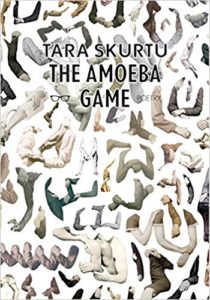Poet Tara Skurtu knows the influence of roots. A third-generation American, she was born in Key West, Florida. But her family’s roots are Romanian. And that fusion of life American and roots Romanian would lead her to a keen awareness of words and language, one she discovered in college in Boston.
That awareness, in turn, has led to poetry. And it’s also led to two Fulbright Awards, two Academy of American Poets prizes, a Marcia Keach Poetry Prize, and a Robert Pinsky Global Fellowship.
It’s also led to The Amoeba Game, her first published collection of poetry.
The poems in the collection are about self-discovery and identity. They’re about family and roots (one section is devoted to poems about Romania). They’re about growing up. Skurtu’s almost hypersensitive awareness of language leads to arresting images and metaphors, as in this poem about Vacation Bible School.
Vacation Bible School

Raise your hand if you’d like to be saved.
I was eight. I sat with my hands in my lap
listening to the other kids repeating
All we like sheep have gone astray,
for the wages of sin is death.
At snack time, the trail mix tasted sour.
Where would I go if our house caught fire
like the neighbor’s? Who wouldn’t want
to be saved? So I asked the teacher,
my hands like a steeple inside her hands
like a steeple. His words in her mouth,
then mine. Words I didn’t understand
formed a film around my thoughts, and I felt
older than her, but it was too late—
I was one of them now, and I would be,
Until the end of summer, changed.
Reading the poem evokes an image of a child with Romanian and Catholic roots being thrust into one of the most common Protestant American experiences imaginable. The child is more aware of her surroundings than the children she’s with. She hears the repetitions, tastes the sour trail mix at snack time, forms her hands into a steeple, and repeats words she doesn’t really understand. The words form a film around her thoughts—and film can suggest both murkiness and a real-life image or reproduction. And she knows she’s changed, at least until the end of the summer.

Tara Skurtu
Skurtu received degrees in English and Spanish from the University of Massachusetts-Boston, and an M.F.A. degree in creative writing from Boston University. Her poems have been published in a number of literary magazines, including Salmagundi, Salamander, The Kenyon Review, Post Road, The Los Angeles Review, Southeast Review, Minnesota Review, and others, as well as in several anthologies. The Amoeba Game is her first published collection. She is based in Boston but is currently living in Romania.
The poems of The Amoeba Game are beautiful and thought-provoking. And they’re more universal than “Romanian roots” might imply. All of us come from parents and grandparents with stories—the Americans born in the Baby Boom, for example, were dramatically shaped by their parents’ experiences of the Great Depression and World War II.
So it is, too, with the children of immigrants, growing up in a new land but powerfully influenced by the lives of parents and grandparents from another time, another place.
Photo by Gabriele Simone, Creative Commons, via Flickr. Post by Glynn Young, author of the novels Dancing Priest and A Light Shining, and Poetry at Work.
__________________________

“I require all our incoming poetry students—in the MFA I direct—to buy and read this book.”
—Jeanetta Calhoun Mish
- Poets and Poems: Sandra Marchetti and “Diorama” - April 24, 2025
- Poets and Poems: Christina Cook and “Roaming the Labyrinth” - April 22, 2025
- Longfellow’s “Paul Revere’s Ride”: Creating a National Legend - April 17, 2025

Bethany Rohde says
These lines (among others) stuck with me:
“… and I felt
older than her, but it was too late—”
Thank you for sharing about this writer and her collection. I’d love to read more of her poetry.
Donna Falcone says
Thanks for this, Glynn. I enjoyed reading this… and am so impressed by this poet’s accomplishements! However, based on this piece you’ve shared, I am not surprised.
Glynn says
The poems in this collection are all rather striking.
Sandra Heska King says
“His words in her mouth,
then mine. Words I didn’t understand . . . ”
There’s a lot in this poem to think about. I’m guessing there’s a lot to think about in her others.